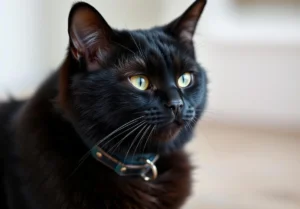Cats, those mysterious furballs that roam our homes, often speak volumes without saying a word. But when your usually chatty kitty suddenly turns mute, it’s like a silent alarm going off—something might just be amiss.
In this blog post, we’ll walk you through the reasons why your cat might have put a pause on meowing, and whether it’s time to hit the panic button or just give them some space.
Quick Takeaways:
- Monitor for signs like loss of appetite, energy level changes, and difficulty breathing along with silence, which may indicate it’s time for a vet visit.
- Encourage meowing through interactive play, establishing a stress-free routine, and rewarding vocalizations.
- Consult a vet if there’s unexplained silence, changes in meow tone, or other symptoms of illness, signaling potential health issues.
Is it Normal for Cats to Stop Meowing?
Cats are unique creatures, and their ways of communicating can be just as varied. So, if your feline friend has suddenly turned the volume down, or off, you might wonder, is this normal? Well, the short answer is: it can be.
Cats communicate for various reasons – to express hunger, discomfort, or the sheer joy of seeing their human. But variations in meowing are not unusual. Some cats are naturally more vocal than others, and changes in their environment, age, or mood can all influence their chattiness. That said, a sudden or gradual decrease in meowing doesn’t always signal a red flag. However, it’s essential to look at the context of this change and consider other accompanying signs.
What Could Cause a Cat To Stop Meowing?
Now, let’s dig a bit deeper into the possible reasons behind why Mr. Whiskers might be giving his vocal cords a rest:
Stress or Anxiety : Just like humans, cats can become stressed. Changes in the household, such as moving, a new pet, or even a change in routine, can leave your cat feeling unsettled. During these times, they might not feel like talking much.
Sore Throat or Laryngitis : Yes, cats can get sore throats too. If meowing is painful, they’re likely to stop. This could be due to yowling too much, an infection, or inflammation. Keep an ear out for any changes in the tone of their meow – a raspy or weaker sound can be a giveaway.
Change in Environment : Cats are creatures of habit, and a new environment can make them go silent as they take in their new surroundings. Whether you’ve moved house or just rearranged your living room, it might take a bit of time for them to adjust and find their voice again.
An often overlooked but vital point is that cats can be discreet about their feelings and health. Unlike dogs, they might not yelp or whine when in pain; they might simply go quiet. Therefore, it’s crucial to pay attention to any sudden changes in their behavior, no matter how small.
When Should You Start Worrying?
As fur parents, it’s normal to worry about our pets. When it comes to your cat’s silence, here are some specific signs to look out for:
- Loss of Appetite: If they’re not eating as usual in addition to not meowing, this could indicate they’re not feeling well.
- Changes in Energy Levels: Is your once playful cat now lethargic? Or the other way around – a typically calm cat becoming agitated?
- Breathing Difficulties: Any noticeable change in their breathing pattern warrants immediate attention.
- Other Symptoms: Sneezing, coughing, or discharge from the eyes or nose alongside a sudden cessation of meowing could point to a respiratory infection or another illness.
An important piece of advice that many overlook is monitoring your cat’s body language. Cats communicate volumes with their tails, ears, eyes, and posture. A tail twitch, flattened ears, or dilated pupils can provide additional clues about their wellbeing.
Should you notice any of these signs, or if your gut tells you something’s off, don’t hesitate to contact your vet. It’s always better to err on the side of caution when it comes to the health and happiness of our feline friends.
Remember, every cat is an individual, and what’s normal for one may not be for another. Keeping a keen eye on their behavior and maintaining regular vet check-ups can help ensure your cat stays healthy and happy. And remember, a silent phase might just be that – a phase. But if it’s out of character for your cat, being proactive is key.
How to Encourage Your Cat to Start Meowing Again
Encouraging your cat to find their voice again can be akin to coaxing a toddler to take their first steps—it requires a blend of patience, love, and a little know-how. Let’s walk through some effective strategies to help your furry friend vocalize once more.
Engage in Interactive Play : Cats often meow to initiate play or express excitement. Find toys that stimulate their predator instincts, like feather wands or laser pointers. This not only encourages them to meow but also strengthens your bond.
Establish a Routine : Cats are creatures of habit, and a consistent daily routine can reduce their stress and encourage them to communicate. Make sure feeding, play, and cuddle times are predictable.
Create a Stress-Free Environment : Stress can silence even the most talkative of cats. Ensure their environment is peaceful and safe. This could involve providing hiding places, reducing loud noises, or gradually introducing them to new pets or family members.
Reward Vocalization : When your cat does meow, reward them with treats, affection, or play. Positive reinforcement can work wonders in encouraging more vocal behavior.
Understand Your Cat’s Personality : Each cat is unique, and some are naturally more silent. Learn to appreciate your cat’s way of expressing itself, even if it’s not through meowing.
A unique tip? Play cat-specific music or sounds that have been designed to soothe and engage cats. Studies have shown that cats respond positively to certain types of music, which might help them feel more comfortable and likely to vocalize. Check out Music for Cats for some scientifically composed tracks.
When to Consult a Vet
Knowing when to transition from patience and home remedies to professional advice is crucial. Here are some scenarios where a vet visit is warranted, along with what to expect:
Unexplained Silence : If your cat, who is usually vocal, suddenly stops meowing, it could indicate a health issue, such as a respiratory infection or a problem with their vocal cords.
Change in Meow : A change in the tone, volume, or frequency of your cat’s meow is also a sign to consult your vet. It can suggest discomfort or an underlying health condition.
Other Symptoms : Look for other signs of illness, such as lethargy, loss of appetite, or changes in behavior. These symptoms, combined with a lack of meowing, necessitate a vet visit.
What to Expect : During your visit, the vet will likely ask about any recent changes in your cat’s environment or behavior. They might perform a physical examination, and in some cases, recommend blood tests, x-rays, or a throat examination.
Possible treatments or examinations could include anti-inflammatory medications for throat inflammation, antibiotics for infections, or even surgical interventions in rare cases involving physical obstructions or tumors.
Remember, your cat’s health and well-being are paramount. By understanding when a vet consultation is necessary and taking proactive steps to encourage your cat to meow again, you’re demonstrating deep care and commitment to your feline friend. From interactive play to consulting a vet, every step you take enhances your bond and ensures your cat lives a happy, healthy, and expressive life.
Alex, a passionate animal lover, has experience in training and understanding animal behavior. As a proud pet parent to two dogs and three cats, he founded AnimalReport.net to share insights from animal experts and expand his knowledge of the animal kingdom.





